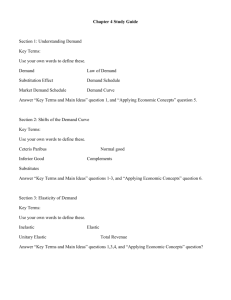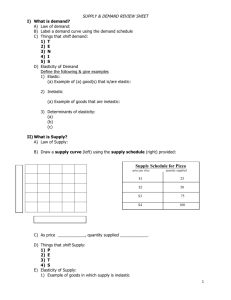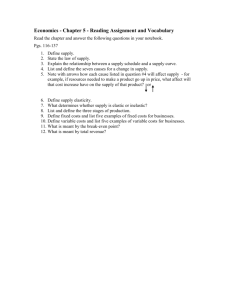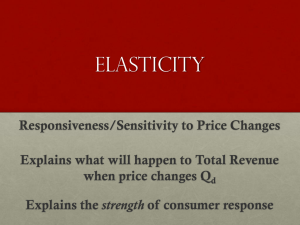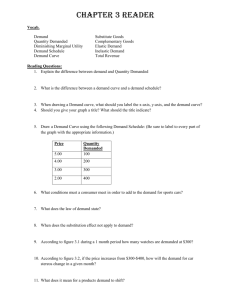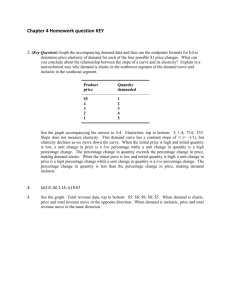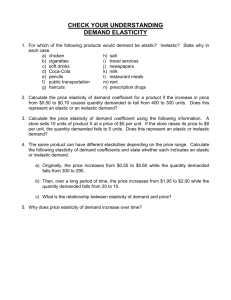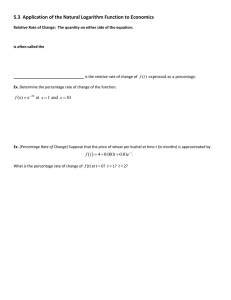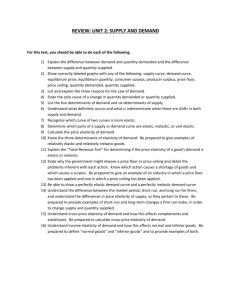Elasticity Notes
advertisement
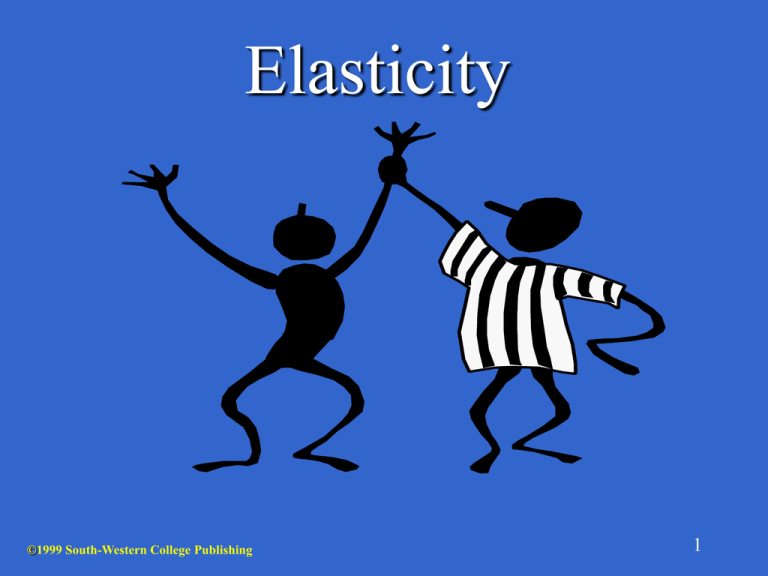
Elasticity ©1999 South-Western College Publishing 1 What is Elasticity? A term economists use to describe sensitivity of quantity demanded or supplied to a change in price. 2 How do we measure the Price Elasticity of Demand? The percentage change in quantity demanded divided by the percentage change in price 3 Price Elasticity of Demand Ed % change in Q = d % change in P Ed = % in Qd % in P 4 Classifying Ed • Ed = 1 Unitary elasticity • Ed > 1 Elastic demand • Ed < 1 Inelastic demand 5 Extreme elasticities • Ed = 0 Perfectly inelastic (vertical demand curve) • Ed = Perfectly elastic (horizontal demand curve) 6 Perfectly inelastic demand P D Perfectly elastic demand P D Q Q 7 When consumers are very sensitive to a price change what does the demand curve look like? Very horizontal 8 When consumers are less sensitive to a price change what does the demand curve look like? Very vertical 9 Price Qu antity Initial New Initial New 25 30 100 40 % % Price change change in Elasticity of in Qd P Demand Ed = % % in Qd in P 60% 20% 3-elastic 60/100 5/25 .6/.2 40 70 120 90 25% 75% 0.33-inelastic 200 220 80 64 20% 10% 2-elastic 50 75 150 135 10% 50% .2-inelastic 10 10 When price increases, what two things happen? • more money per unit •fewer units are sold 11 What factors influence Demand Sensitivity (elasticity)? • Number and closeness of Substitute goods • % of income a good makes up • Basic goods or “needs” • Time to adjust 12 What do substitutes have to do with sensitivity? The more substitutes a good has, the more sensitive consumers are to a price change 13 A P P D D 0 Q B 0 Q Which demand curve is for spark plugs and which for Coca-Cola? 14 What does % of income a good makes up have to do with sensitivity? The lower the % of ones budget a good is, the less sensitive consumers are to a price change SALT! 15 What do basic goods have to do with sensitivity? The greater the need a good has to the consumer, the less sensitive the consumer is to a price change WATER! 16 What does time have to do with sensitivity? The more time to adjust, the more sensitive consumers are to a price change 17 If a college raises tuition, what happens to revenue? If demand is elastic revenue goes down If demand is inelastic revenue goes up 18 Elasticity and Total Revenue (TR) TR = PQ (price times quantity) Ed = % change in Qd % change in P 19 If total revenue does not change when price increases, the demand curve is unitary elastic, value equals 1 20 If price increases and the revenue gained is less than the revenue lost, the demand curve is price elastic, > 1 21 If price increases and the revenue gained is greater than the revenue lost, the demand curve is price inelastic, < 1 22 Summary, elasticity, price changes, and total revenue Price increase Total revenue same Price Decrease Total revenue same Ed > 1 Total revenue falls Total revenue rises Ed < 1 Total revenue rises Total revenue falls Ed = 1 23 What is Cross Elasticity of Demand? The percentage change in the quantity demanded of one commodity resulting from a 1 percent change in price of another commodity 24 What is Income Elasticity of Demand? The ratio of the percentage change in quantity demanded to the percentage change in income 25 E i = % Quantity % Income • E i > 0 Normal goods • E i < 0 Inferior goods • E i > 1 Luxury goods • 0 < E i < 1 Necessities 26 When does a good face an income elastic demand curve? A 1% change in income generates a greater than 1% change quantity demanded 27 When does a good face an income inelastic demand curve? A 1% change in income generates a less than 1% change quantity demanded 28 What is an Inferior Good? Something that people will buy less of as their incomes increase I bought Mac and Cheese in college, but refuse to buy it now! What’s the difference in my income? 29 What is a Normal Good? Something that people will buy more of as their incomes increase I bought bologna in college, but now I buy steak! What’s the difference in my income? 30 What is Price Elasticity of Supply? The ratio of the percentage change in quantity supplied to the percentage change in price 31 E s = % Q supplied % Price • E s = 1 Unitary • E s > 1 Elastic • E s < 1 Inelastic 32 Extreme cases of E s • E s = 0, perfectly inelastic (vertical supply curve P S Q P • E s = , perfectly elastic (horizontal supply curve) S Q 33 Does time effect Supply Elasticities? Yes! The more time, the more elastic the supply curve 34 Which type of good would be best to tax to raise the most revenue? Goods that face a price inelastic demand curve will generate the most revenue 35
